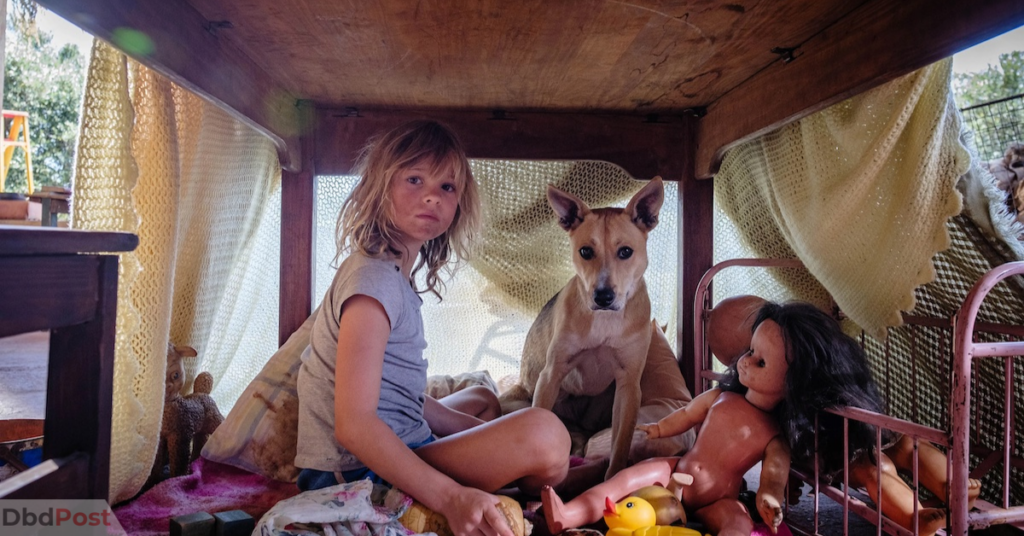Sony Pictures Classics has announced the theatrical release of Don’t Let’s Go to the Dogs Tonight. It marks the directorial debut of actress Embeth Davidtz. The movie will debut in New York and Los Angeles on July 11, 2025.
Following its limited release, the film will expand to more cities. Sony aims to build momentum through word of mouth. The wider rollout will happen in the weeks after its debut.
The story comes from Alexandra Fuller’s memoir of the same name. It tells a deeply personal story of childhood during a time of war. Davidtz brings this vivid narrative to life on screen.
The film is set in early 1980s Zimbabwe and follows 8-year-old Bobo. Her family owns a farm in what was once Rhodesia. Their lives change drastically as the Zimbabwean War for Independence ends.
The country was in turmoil at the time. The colonial system was collapsing, and a new national identity was beginning to emerge.
Through Bobo’s eyes, we see innocence meet political chaos. Her voice guides the story, helping the audience understand family love and national unrest.
Davidtz tells the story with care and sensitivity. She captures the personal and political, creating a powerful cinematic experience.
The family clings to its connection to the land but faces uncertainty as war disrupts its way of life. Every moment brings tension, change, and the threat of loss.
Despite the hardship, Bobo remains curious and strong. Her youthful wonder gives the film its emotional heart. Her story reminds us how children make sense of a world in conflict.
The cast includes several emerging talents. Lexi Venter plays young Bobo, and her performance has already received early praise.
Joining her are Zikhona Bali, Fumani N Shilubana, Rob Van Vuuren, and Anina Hope Reed. Davidtz also appears in a supporting role. Together, the cast brings authenticity and depth to each scene.
The film premiered at the 2024 Telluride Film Festival and screened at the Toronto and Zurich Film Festivals. Critics responded with strong reviews.
Audiences praised Davidtz’s direction and the screenplay. Many also highlighted Venter’s emotional and naturalistic performance. Her portrayal of Bobo stood out as the film’s soul.
Critics called the film lyrical and moving, admiring its ability to balance personal and political themes. The storytelling was described as elegant, focused, and emotionally raw.
In interviews, Davidtz shared her passion for the project. She explained her deep connection to the source material. As someone with South African roots, the story felt personal.
She wanted to explore memory, identity, and change. She succeeded, and the result is an intimate and far-reaching film.
Moreover, Davidtz’s experience as an actress enriches her direction. She understands the emotions of her characters, and her attention to detail shapes every scene.
The cinematography captures Zimbabwe’s beauty and danger. Each frame reflects Bobo’s inner world. The visuals match the emotional weight of the story.
Sony Pictures Classics often supports artist-driven films. Their decision to back this one shows confidence in its impact. They believe the film can reach audiences on a deep level.
Sony’s track record includes many award-winning films. Their support positions this one for critical success, and it may become a key title in the 2025 awards season.
The release strategy will start small. But word of mouth could push it into the spotlight. Festival buzz already gives it strong momentum.
Viewers can expect a film that lingers. It invites reflection long after the credits roll, and every scene builds toward a lasting emotional experience.
Some viewers may relate personally to the story, while others will gain a new perspective on African history. Either way, the film encourages empathy and curiosity.
Its themes are universal: family, change, and survival. These make the story accessible, even to those unfamiliar with Zimbabwe’s past.
The screenplay draws directly from Fuller’s memoir. Yet Davidtz adds her voice. Her direction brings clarity, mood, and emotional rhythm.
The memoir was already celebrated for its honesty. The film continues that legacy, keeping the memoir’s emotional truth intact.
Pacing is key to the film’s success. Scenes move with intention, and tension builds naturally, never rushing.
The sound design also enhances the experience. Natural sounds add realism. Silence becomes a powerful storytelling tool.
Davidtz uses music sparingly. When used, it amplifies emotion. It never overwhelms the scenes.
Color and lighting play an important role. They reflect Bobo’s inner shifts, and light fades or sharpens to match the mood.
In many scenes, the camera lingers, making these moments feel like memories. The audience shares Bobo’s experience rather than watching from a distance.
Transitions between past and present flow smoothly. Nothing feels forced or confusing, and the editing respects the viewer’s attention.
Dialogue is minimal but impactful—every word matters. Emotions often speak louder than speech.
Some scenes use Bobo’s narration. Her voice ties the film together. It reminds us this is her story.
Despite its serious subject, the film is warm. Small moments of joy shine through, offering relief and humanity.
A child’s laughter. A family meal. A quiet sunset. These details add texture and contrast.
The actors bring authenticity to every line. Their performances feel grounded. Emotions never feel exaggerated or hollow.
The film avoids melodrama. It trusts the audience. Viewers are allowed to feel without being told how to feel.
This respect for the audience is rare. It makes the film more powerful, inviting reflection instead of reaction.
Ultimately, Don’t Let’s Go to the Dogs Tonight is about belonging. It asks where we come from and who we become. It does so without easy answers.
Bobo’s journey feels both unique and familiar. Her story of loss and resilience resonates across borders and generations.
Critics, fans, and film lovers are watching closely. The film may become one of the year’s most talked-about dramas.
Early buzz suggests awards potential. Some predict nominations for acting, direction, and screenplay. It could be a breakout moment for both Davidtz and Venter.
But beyond awards, the film offers a lasting impact. It tells a story worth remembering. And it does so with grace, honesty, and skill.
As viewers prepare to meet Bobo, they will discover much more. They’ll witness the end of an era. And the beginning of a voice that refuses to be forgotten.
- 107shares
- Facebook Messenger
About the author
Sarika Patel is an Associate Writer at DbdPost, where she combines her keen research skills and clear storytelling to create engaging, informative digital content. With a background in journalism, Sarika is passionate about uncovering unique insights and helping readers navigate a wide range of topics. Outside of work, she enjoys exploring new places, indulging in a good book, and sharing her love of learning with others.





